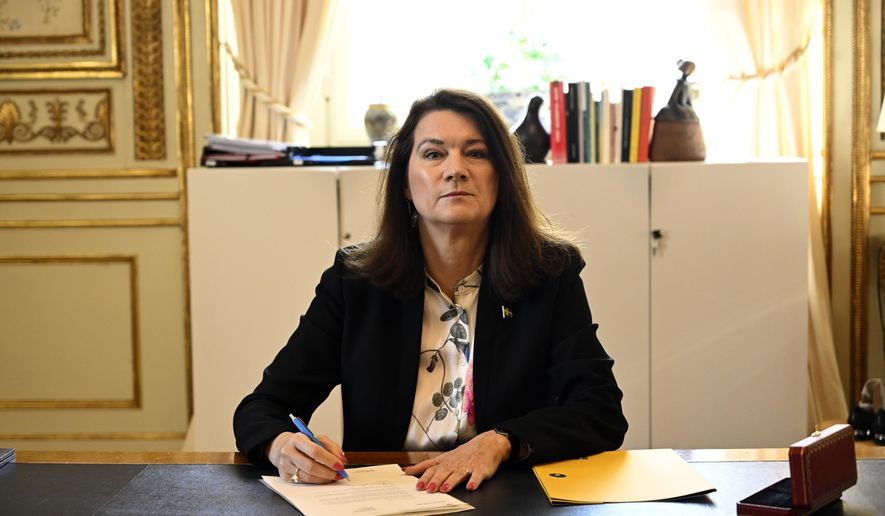STOCKHOLM (AP) — Sweden and Finland on Tuesday pushed ahead with their bids to join NATO even as Turkey insisted it won’t let the previously non-aligned Nordic countries into the alliance because of their alleged support for Kurdish militants.
Turkish President Recep Tayyip Erdogan’s strongly worded objections caught the two applicants and other NATO members off guard, complicating what was envisioned to be a swift expansion of the alliance in the wake of Russia’s invasion of Ukraine.
“Turkey’s statements have changed very quickly and hardened in recent days. But I am sure that we will resolve the situation with constructive talks,” Finnish President Sauli Niinisto said during a visit to Stockholm, the Swedish capital.
The Finnish parliament on Tuesday resoundingly rubber-stamped the government’s decision to seek membership in an 188-8 vote, while Sweden’s foreign minister signed a formal application letter to be handed over to the alliance’s headquarters in Brussels.
But Erdogan’s objections on Friday and again on Monday raised questions about how quickly the application process could advance, as unanimity among all 30 NATO countries is required for new members to join. The Turkish leader accused the Nordic countries of giving safe haven to “terrorists” and imposing sanctions on Turkey - an apparent reference the suspension of Swedish and Finnish weapons exports in 2019 after Ankara sent troops across the border into Syria to attack Kurdish fighters.
Erdogan also dismissed a Swedish plan to send a team of diplomats to Turkey to discuss the issue, saying “don’t wear yourselves out.”
Swedish Foreign Minister Ann Linde told domestic news agency TT that “a series of diplomatic efforts are underway,” but declined further comment.
Turkey’s objections appeared to have come as a surprise also in Washington, whose relations with Ankara have been strained in recent years. The U.S. suspended Turkey from its F-35 fighter jet program over Turkey’s decision to purchase a Russian missile defense system.
Turkish Foreign Minister Mevlut Cavusoglu was traveling to Washington for meetings Wednesday with Secretary of State Antony Blinken. Meanwhile, the White House announced that President Joe Biden would meet Niinisto and Swedish Prime Minister Magdalena Andersson in Washington on Thursday to discuss their NATO applications “as well as strengthening our close partnerships across a range of global issues and support for Ukraine.”
Joining NATO would be a huge shift for the two Nordic countries. Sweden has stayed out of military alliances for more than 200 years, while Finland adopted neutrality after being defeated by the Soviet Union in World War II.
Russia has repeatedly warned its Nordic neighbors that their joining the alliance would have negative repercussions. The Swedish prime minister warned citizens to brace themselves for potential disruptive moves by Russia, including disinformation and attempts to intimidate and divide the country.
The Russian Foreign Ministry said Tuesday it was expelling two Finnish diplomats and would leave a multinational organization focused on the Baltic Sea. It also said the Finnish ambassador was read a protest against “Finland’s confrontational course in relation to Russia,” including its role in international sanctions against Russia and arms supplies to Ukraine. The statement made no mention of NATO.
European officials expressed hope that Turkey’s objections to Finnish and Swedish membership in NATO could be overcome.
The European Union’s foreign policy chief Josep Borrell said the two countries would “receive strong support, I’m sure, from all member states, because it increases our unity, and it makes us stronger.”
Luxembourg’s long-serving Foreign Minister Jean Asselborn told Germany’s Deutschlandfunk radio that he suspects Erdogan is merely “pushing up the price” for the two countries’ membership.
“At the end of the day, I am convinced that Turkey can’t slam the brakes on this,” he said.
Turkey accuses several European countries including Sweden and Finland of supporting Kurdish militants, leftist extremists and followers of the U.S.-based Muslim cleric Fethullah Gulen who Ankara claims was behind a failed military coup attempt in 2016.
Many Kurdish and other exiles have found refuge in Sweden over the past decades, as have members of Gulen’s movement more recently. According to Turkey’s state-run media, Sweden and Finland have refused to extradite 33 people wanted by Turkey.




Please read our comment policy before commenting.